Article and photos by Rob Danforth
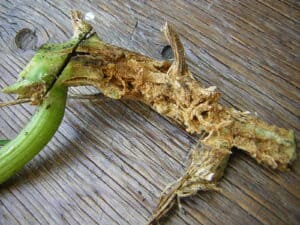
A squash vine bore is like a little subway train running along inside the center of the vine stalk. All summer squash (e.g., zucchini, patty pan) and winter squash (e.g., acorn, spaghetti, butternut, pumpkin) are susceptible. The bore usually enters via a small hole which it makes near the base of the plant and then eats its way unseen along the stalk. If you do not take some preventative measures, the result will be a very ugly looking rot at the plant’s base and you may lose the plant.
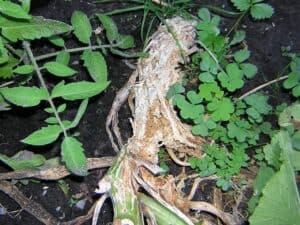
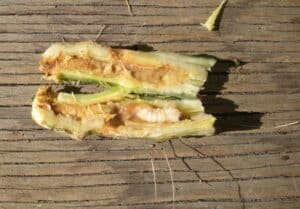
If you cut out a section ahead of the rot, you will find the bore inside the stem however, depending on the length of time the bore has had to eat, you may have to cut farther along to find the bore.
Two options can act as preventatives. One is to cover the base of the stem with mulch and prevent the winged adult from laying an egg on the stalk at the
base of the plant. An egg hatches in about 2 weeks and the bore drills a small hole (hard to see) into the stem and dines at leisure away from prying eyes.
The second option is to wrap the base of the stem, from 8 to 10 inches along, in one layer of aluminum foil or with a piece of row cover.
You can cover the whole plant in a row cover, but remember to uncover for
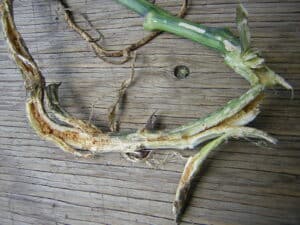
about 2 hours a day to allow pollinators to pollinate the flowers. I find it easier to protect just the base, as squash bees tend to take up residence
in bare soil near plants (hole as round as a pencil) and some of them camp out indefinitely right in my squash flowers, even overnight when the squash flowers close at sunset.
If you get a squash vine bore as a dinner guest in your garden, all may not be lost, as squash plants are travelling vines which wander all over the ground soil and can re-root themselves at nodes along the vine – you might encourage this as extra insurance against a vine bore.
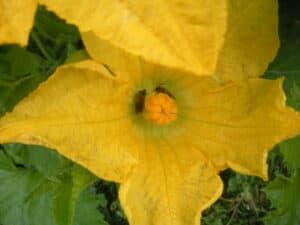
Ahh insects! … can’t live with some of them, but can’t live without most of them – even mosquitos are pollinators. Happy gardening whatever the setbacks – all gardens have setbacks! Why not chalk it up as a small libation/sacrifice to nature in thanks for the other bounty provided?